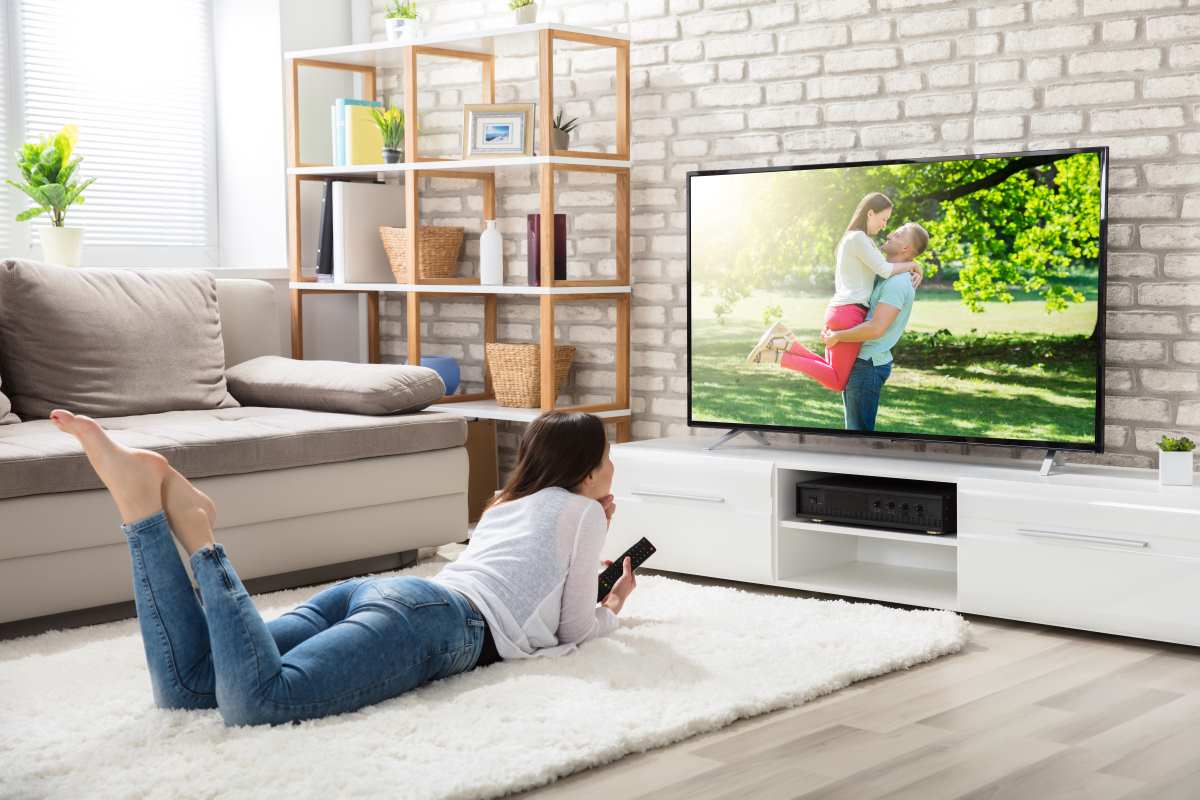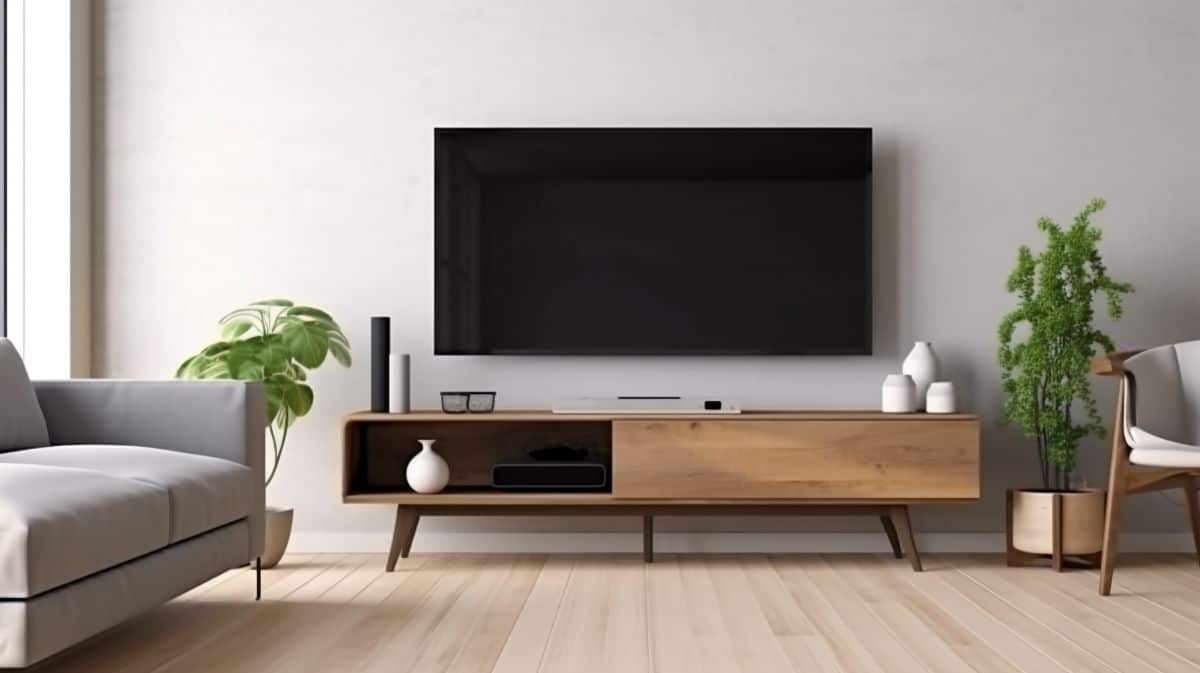the essentials in brief
Generally speaking, a modern TV can last around 10 years or more if you treat it well.
A TV is considered obsolete when it no longer meets current technological standards or is no longer compatible with new devices or content. Learn more…
The most durable televisions are those that have high picture quality, good workmanship and ease of use. Here you can learn more about factors for the longevity of a TV...
You bought a new TV and want to know how long a TV actually lasts? Or do you have an older TV that still works well and that you don't want to replace? Then you are right here.
In this article you will learn how to extend the life of your TV, which factors influence the lifespan and how you can tell if your TV is outdated.
Contents
How to extend the life of your TV

The lifespan of your TV depends not only on the quality of the device, but also on the way you use and care for it. Here are some tipshow to extend the life of your TV:
- Turn off your TV when you don't need it. This not only saves electricity, but also protects the screen and the electronics. Also, avoid standby mode as it still consumes power and heats up the device.
- Place your TV in a suitable place. Avoid direct sunlight, high humidity or strong temperature fluctuations. These can damage the screen or cause a short circuit. Also ensure good ventilation and avoid placing other heat sources such as radiators or lamps near the TV.
- Clean your TV regularly. Dust and dirt can affect image quality or clog the ventilation slots. Use a soft cloth and mild detergent to gently wipe the screen. Never use alcohol, solvents, or abrasive cleaners as these can scratch or damage the screen. Also remove dust from the ports and cables with a brush or Vacuum cleaner.
- Calibrate your TV correctly. The factory settings of your television are often not optimal for your viewing habits or your environment. Excessive brightness, contrast or color saturation can overshadow or distort the image and cause the screen to age more quickly. Therefore you should calibrate your television according to your personal preferences or use a special calibrationDVD or -Blu-ray Use to find the optimal settings.
- Update your TV's software. If your TV has a Smart TV feature, you should check for software updates regularly. These can fix errors that Performance improve or add new features. You can carry out updates either automatically or manually via the menu of your television.
Tip: It is important to protect your TV from surges or power outages. You can use a power strip with surge protection, which protects your TV from voltage spikes or short circuits. You should also disconnect your TV from the power supply during a thunderstorm or if you are going to be away for a long time to avoid damage.
What factors affect the lifespan of your TV?

Whether your TV has a long lifespan depends not only on your use and care, but also on some technical factors, which you should consider when buying a new device. Here are a number of factors that affect the lifespan of your TV:
- The display technology: There are different types of displays that differ in image quality, energy consumption and lifespan. The most common are LCD, LED, QLED and OLED. LCD and LED TVs have a similar lifespan of around 70.000 hours, with LED TVs being slightly more economical and brighter. QLED televisions are a further development of LED technology and offer higher color fidelity and brilliance. They have a lifespan of around 60.000 to 100.000 hours, depending on the model and quality. OLED TVs have a very high picture quality with perfect black and high contrast. However, they have a shorter lifespan of around 20.000 to 30.000 hours because the organic light-emitting diodes lose their luminosity over time.
- The Resolution: The resolution indicates how many pixels the display has and how sharp the image is. The most common resolutions are Full-HD (1920 x 1080 pixel) and 4K (3840 x 2160 pixels). While resolution does not have a direct impact on screen lifespan, it can affect image quality when viewing content at different resolutions. For example, a full HD television can display a 4KSignal does not display fully and needs to be scaled down, which can result in a blurry or pixelated image. Conversely, a 4K TV can upscale a Full HD signal, which can result in an artificial or washed-out picture. Therefore, when buying a new television, make sure that it supports the resolution that you use or want to use most often.
- The refresh rate: This rate is the number of times the screen refreshes per second and is measured in Hertz (Hz) measured. The higher the refresh rate, the smoother and more natural movement on the screen will look. The most common refresh rates are 50Hz, 60Hz, 100Hz, or 120Hz. While refresh rate does not directly affect screen lifespan, it can affect image quality when viewing content at a different refresh rate. For example, a TV with a low refresh rate cannot fully display a signal with a higher refresh rate and must adjust it, which can result in a jerky or blurred picture. Conversely, a TV with a high refresh rate cannot fully display a low refresh rate signal and must interpolate it, which can result in an unnatural or exaggerated picture. When buying a new television, you should therefore make sure that it supports the refresh rate that you use or want to use most often.
Did you know that…
...the first German television program was broadcast on March 22, 1935 and only had around 400 viewers watching in public television rooms? The program consisted of a film about the Olympic Games in Berlin and a live transmission from an airfield in Berlin-Tempelhof.
How you can tell if your TV is outdated
Even if your television still works well and has an acceptable picture quality, it may be that it now obsolete and no longer offers you the optimal viewing experience. Here are some signs you can use to tell if your TV is outdated:
- Your TV has ka smart TV system or it is very slow or restricted. With a smart TV system, you can connect your TV to the internet and various apps like Netflix, YouTube, Amazon Prime Video or Spotify to use. If your TV doesn't have a Smart TV system, or if it's very slow or limited, you're missing out on many opportunities to stream your favorite content or discover new ones. While you can connect an external streaming stick or box to turn your TV into a smart TV, this can add additional costs and complications.
- With your television there is no 4K resolution or HDR support. 4K resolution is the new standard for picture quality, offering four times more pixels than Full HD. HDR support is a technology that improves the contrast and colors of the image and more realistic and vivid images generated. If your TV doesn't have 4K resolution or HDR support, you won't be able to fully enjoy the latest movies, series or games produced in these formats. Although you can connect a 4K or HDR-capable Blu-ray player or console to play this content, it can come with additional costs and complications.
- The Connection your television is insufficient or outdated. Ports are important for connecting your TV to other devices such as Blu-ray players, consoles, soundbars or Loudspeakers to connect. If your TV doesn't have enough ports or they are outdated, you won't be able to connect all your devices at the same time or transmit the best quality. For example, a HDMI-connection version 1.4 does not transmit a 4K signal with 60 Hz or an HDR signal, you need an HDMI connection version 2.0 or higher for this. Of course you can use an HDMI switch or an AVReceiver use to have more ports or upgrade them, but that can associated with additional costs and complications .
So you can use your TV for a long time
you have now experienced how long a television lasts on average, when it is considered obsolete and what factors affect its lifespan. You've also received some tips on how to extend the life of your television by using, caring for and adjusting it properly.
And if you do decide to buy a new television, you have learned a few criteria that can help you make your choice. We hope you enjoyed this article and that you are now more fun on your TV have.
Sources:
- https://praxistipps.chip.de/lebensdauer-von-fernsehern-einschaetzung-faktoren-und-tipps-zur-verbesserung_99004
- https://www.computerbild.de/artikel/avf-Tipps-Fernseher-QLED-Lebensdauer-31536041.html
- https://www.netzwelt.de/news/213926-lebensdauer-tv-geraeten-so-lange-halten-led-qled-oled-modelle.html


![TELEFUNKEN XH32SN550S 32 Inch TV/Smart TV (HD Ready, HDR, Triple Tuner) - Incl. 6 Months HD+ [2023], Black](https://m.media-amazon.com/images/I/419OK6bmKEL.jpg)
![Hisense 43E6KT 108cm (43 inch) TV, 4K UHD, Smart TV, HDR, Dolby Vision, Triple Tuner DVB-C/S/S2/T/T2, Frameless, WiFi, Bluetooth, Alexa Built-In, DTS Virtual X, Hotel Fashion, Black [2023]](https://m.media-amazon.com/images/I/41HWxxUWgOL.jpg)